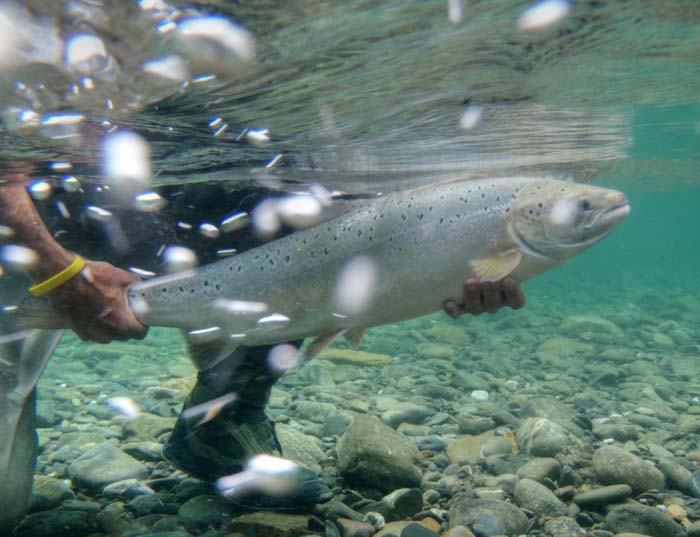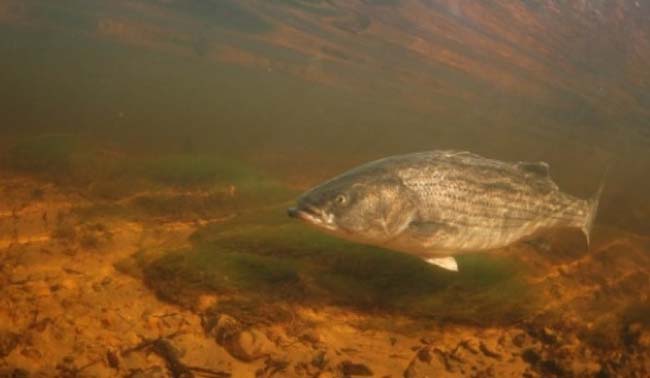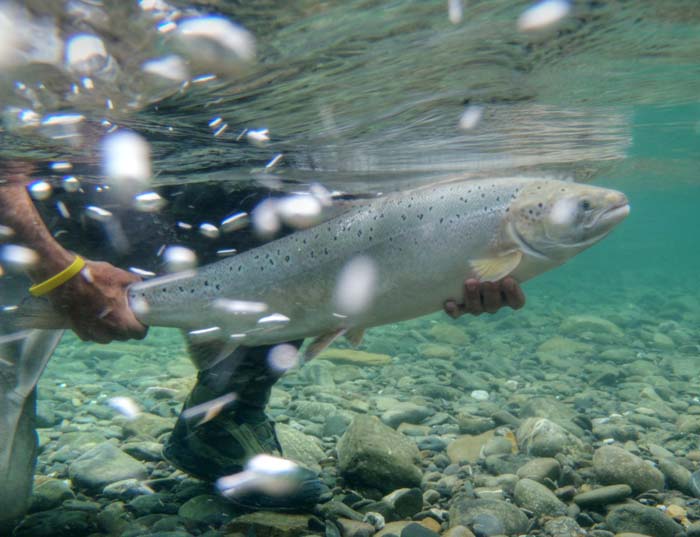
Release of large Atlantic salmon on Godbout River, QC, 2012 (photo ASF)
By Skip Clement
[dropcap]O[/dropcap]n January 19, 2018, David Brooks, a Concord, New Hampshire blogger for the Concord Monitor wrote: “Striped bass vs. Atlantic salmon – Canada study says the stripers are winning.” More recently, July 20, 2018, and only 500 miles away from Concord, the Miramichi Salmon Association (MSA), South Esk, New Brunswick, wrote: “Wild Atlantic Salmon in Crisis on Miramichi As Predatory Bass Populations Explode.”
There are three underlying crisis’ going on in those two titles:
1. The Northeast quadrant of the US has made a valiant but too late, too little attempt to restore the once thriving forage fish and Atlantic salmon fisheries. Successes in daming, overfishing, and polluting have seemingly won out.
2. An economically successful Atlantic salmon fishery in Canada’s New Brunswick Province, the Miramichi River watershed (Miramichi River) is facing extinction.
Because of warming waters, changing currents, earlier than usual spawning times – as little as two weeks earlier, have fostered striped bass population exploding, and thus, salmon parr>smolt are too vulnerable to survive in numbers that will support a future Atlantic salmon fishery.
3. The most damaging of all is the potential for a deeply dividing conflict between salmon fly fishers and bass anglers. If their disconnect ends up a perfect storm, they will leave solving a problem to bureaucrats who may not do more than make things worse.
Mark Hambrook, president of the Miramichi Salmon Association (MSA) said: “We need to get the ecosystem in balance”
. . . Striped bass are consuming out-migrating juvenile Atlantic salmon in New Brunswick’s Miramichi River at a much higher rate than previously believed.
Today the salmon, and those who depend on it for their living, are in crisis. Striped bass populations have exploded with the undesired side effect of swallowing up young salmon. The Miramichi Salmon Association Inc. (MSA) is taking steps to raise awareness about the risks to New Brunswick salmon populations.
Predatory bass have exploded from 50,000 fish ten years ago to over 1 million today. At the same time, wild Atlantic salmon populations are in crisis and at historic lows. Twelve years ago transmitters on young salmon smolt confirmed 70% were making the successful journey to sea from the Miramichi. Today preliminary data results for this year indicate that less than 25% are making it to sea.”

An adult striped bass stalks a Miramichi River pool for smolts. Photo Meghan Wilson, Canadian DFO.
Guides who have worked the river for 70 years have seen nothing like it. Mervin Green is one of them
It is a crisis. Bass are a warm water fish, and for the first time in my 70 years on the river, bass have migrated 80 miles north from the estuary. We see pools of 100 where there used to be salmon. We haven’t seen any salmon parr since the bass arrived. There are reports of schools of bass so thick they are getting caught in propellers of boats.”
If you want to help:
Mark Hambrook, president
Miramichi Salmon Association . . .
South Esk Office
485 Route 420
South Esk, NB E1V 4L9
Tel: (506) 622-4000


